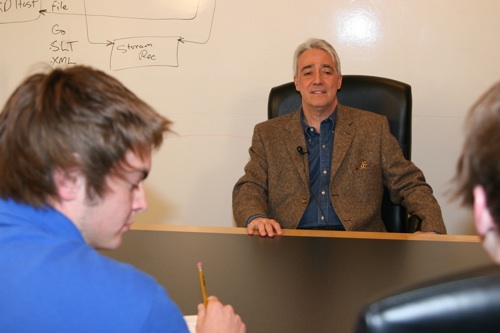Power of the Question
Lesson 3: Writing with Purpose

Scott Simon conducting an interview.
Prior to class, teacher should select the general topic for a class inquiry/research project that directly relates to the curricular content of the course. For example, topics could include a historical time period, a literary or social movement, or cultural phenomenon. Think of this topic not simply as a word or phrase, but rather as a fertile question. A fertile question is open, undermining, rich, connected, charged, and practical. For example, instead of asking students to consider X as a whole, ask students a fertile question about the topic, such as X.
For more information on fertile questions, see Harpaz and Lefstein (2000) “Communities of Thinking”.
WARM-UP ACTIVITY
Write the fertile question for the class inquiry/research project on the board. In their journals, have students brainstorm a list of what they already know about the topic.
CONCEPT FORMATION
As a class, create a large concept map or web on the board. Write the fertile questions for the research project in a circle in the center of the board. Ask students to share what they already about the topic and record their ideas on the concept map. Help students to organize their ideas and create subcategories within the concept map.
Next, ask students to generate a list of questions that can be derived from the central fertile question. Record these questions in list-format or create a second concept map composed of student questions about the topic. Encourage students to include both research-based and naïve questions.
Show part three of Simon video. In this section, Simon discusses the importance of effective questions and how questions can lead to better understanding. In turn, better understanding can lead to more questions. Review these ideas with students.
APPLICATION
Inform students that they will be conducting a research project guided by questions. Small groups of students will work together to develop and investigate a research question that was derived from the fertile question. Help students create high-quality research questions that are open and rich, yet still practical for students to investigate given the time and resources constraints within the class.
Once each team has decided on a research question, encourage students to record their initial hypothesis to the research question and develop a plan for exploring the question. Give students ample time to gather data, analyze their findings, and draw conclusions. Ask students to use a variety of sources and consider multiple perspectives on their question.
This research phase will likely require several class periods, as well as out-of-class time. During each class session, check in on the progress of student groups and teach mini-lessons to students as needed to support the research process. Possible topics for mini-lessons include primary versus secondary sources, the validity of online sources (such as Wikipedia), and effective note-taking. Continually refer students back to their research question to see if their inquiry is on track and focused on the question.
After student groups have adequately researched their question, ask each group to develop and present its findings and conclusions in the form of a performance. Options for performance include, but are not limited to: dramatic skit or role-play, PowerPoint presentation, research paper, short story or creative essay, poster or other visual exhibition, mock trial, museum exhibition, and student-produced video or podcast.
Return to the fertile question and ask students to reconsider this large question now, in light of their own research and what they learned from the research questions of their peers.
As a class, reflect on the research process. Questions to discuss include: How did the fertile question guide all learning? What was it like to conduct research based on a question? What challenges did you face? How did your team work together? If we were to do this project again, how could we improve it?
Finally, ask students what other questions were generated through their research. Refer back to Simon’s idea that questions lead to greater understanding which leads to more questions. Did this happen during this project? Why or why not?
STANDARDS
This lesson meets content and skill standards across the middle and high school curriculum. In particular, this lesson addresses standards related to communication, research skills, critical thinking, and inquiry. Such standards can be found in a range of different disciplines, including Language Arts, Social Studies, Technology, Journalism, and Science. We encourage you to review state standards to determine what standards are applicable to your classroom. National Standards may also prove helpful and can be located at:


